Garden Maintenance in Heston: Keeping Your Outdoor Space Pristine

Maintaining a beautiful garden in Heston requires dedication, expertise, and the right strategies. Whether you're a seasoned gardener or a homeowner looking to enhance your outdoor space, understanding the key aspects of garden maintenance in Heston is essential. This comprehensive guide will walk you through the best practices to ensure your garden remains vibrant and healthy throughout the year.
Heston's unique climate and soil conditions present both opportunities and challenges for garden enthusiasts. By tailoring your maintenance practices to suit these specific conditions, you can achieve a lush, thriving garden that complements your home’s aesthetic. From seasonal tasks to ongoing care, we've got you covered.
In this article, we'll explore various facets of garden maintenance, including pruning, lawn care, pest management, and more. You'll also find valuable tips on selecting the right plants and designing a garden that requires minimal upkeep while maximizing beauty.
Understanding the Importance of Garden Maintenance

Regular garden maintenance in Heston is crucial for several reasons. A well-maintained garden not only enhances the visual appeal of your property but also promotes a healthy ecosystem. Proper maintenance helps prevent the spread of pests and diseases, ensures that plants receive adequate nutrients, and maintains the overall structure and design of your garden.
Neglecting garden maintenance can lead to overgrown plants, invasive weeds, and potential damage to your property. It can also create an uninviting environment and reduce the lifespan of your plants. By committing to a consistent maintenance schedule, you ensure that your garden remains a source of pride and relaxation.
Moreover, maintaining your garden can increase the value of your property. A well-kept garden is a significant selling point for potential buyers and can make your home stand out in the Heston real estate market.
Key Elements of Garden Maintenance

Effective garden maintenance in Heston involves several key elements. Here are the primary areas to focus on:
- Pruning and Trimming: Regular pruning encourages healthy growth, removes dead or diseased branches, and maintains the desired shape of your plants.
- Lawn Care: Maintaining your lawn involves mowing, fertilizing, and managing weeds to keep it green and lush.
- Weed Control: Removing weeds prevents them from competing with your plants for nutrients and water.
- Soil Management: Ensuring your soil is rich in nutrients and properly aerated promotes healthy plant growth.
- Pest Management: Monitoring and controlling pests helps prevent damage to your plants and maintains garden health.
Focusing on these elements will help you create a sustainable and beautiful garden that thrives year-round.
Seasonal Garden Maintenance Tips

Each season in Heston brings its own set of challenges and opportunities for garden maintenance. Adapting your care practices to the changing seasons ensures that your garden remains healthy and vibrant throughout the year.
Spring Maintenance
Spring is the perfect time to revitalize your garden after the winter months. Start by clearing any debris and preparing your soil for new growth. Planting new flowers and shrubs can add color and life to your garden. Additionally, apply a balanced fertilizer to provide essential nutrients to your plants.
Summer Care
During the summer, focus on watering your garden adequately to combat the heat. Mulching can help retain moisture and reduce weeds. Regularly check for pests and diseases, and take prompt action if any issues arise.
Autumn Preparation
As the weather cools, prepare your garden for the upcoming winter. Rake fallen leaves, prune dead branches, and plant bulbs for spring blooms. Protect sensitive plants from frost by covering them or bringing them indoors if necessary.
Winter Maintenance
In winter, minimize garden activities but use this time to plan for the next growing season. Inspect your tools, clean up any remaining plant debris, and ensure your garden structures are in good condition.
Choosing the Right Plants for Heston Gardens

Selecting the appropriate plants is vital for successful garden maintenance in Heston. Opt for plants that are well-suited to the local climate, soil, and light conditions. Native plants are an excellent choice as they are adapted to the environment and require less maintenance.
Consider the following factors when choosing plants:
- Climate Tolerance: Ensure plants can withstand Heston's temperature ranges and rainfall patterns.
- Soil Compatibility: Test your soil's pH and nutrient levels to select plants that thrive in those conditions.
- Water Requirements: Choose plants with similar watering needs to simplify your maintenance routine.
- Growth Habits: Be mindful of the size and shape of plants to avoid overcrowding and ensure proper air circulation.
By selecting the right plants, you can reduce maintenance efforts and enjoy a flourishing garden with minimal intervention.
Essential Tools for Garden Maintenance
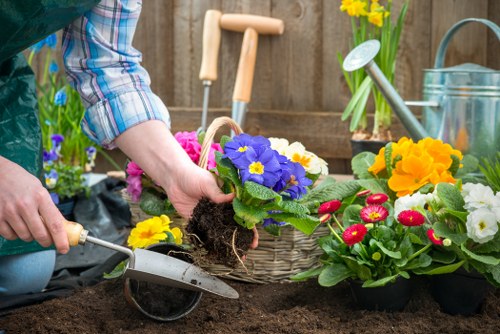
Having the right tools is essential for efficient garden maintenance in Heston. Investing in quality equipment not only makes tasks easier but also ensures longevity and better performance. Here are some must-have tools for your garden:
- Pruning Shears: Ideal for trimming small branches and shaping plants.
- Lawn Mower: Keeps your grass neat and even.
- Garden Fork: Helps in aerating and loosening the soil.
- Watering Can or Hose: Ensures your plants receive adequate moisture.
- Weeder: Efficiently removes unwanted weeds without disturbing surrounding plants.
Maintaining and properly storing your tools extends their lifespan and ensures they are ready for use when needed.
Professional Garden Maintenance Services in Heston
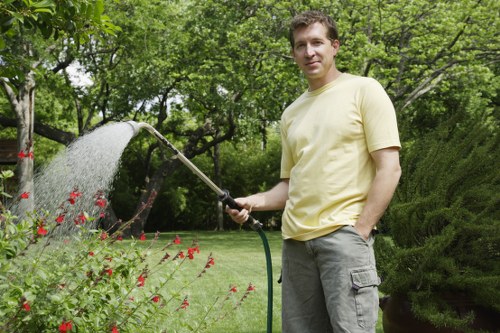
While DIY garden maintenance can be fulfilling, hiring professional services can save you time and ensure high-quality results. Professional gardeners in Heston have the expertise and equipment to handle tasks efficiently, from routine maintenance to complex landscaping projects.
Benefits of hiring professionals include:
- Expert Knowledge: Professionals understand local climate and soil conditions, enabling them to make informed decisions about plant care.
- Time-Saving: Outsourcing maintenance allows you to focus on other priorities without compromising your garden's health.
- Consistent Results: Regular professional maintenance ensures your garden remains in top condition year-round.
- Customized Services: Tailored maintenance plans address the specific needs of your garden.
Consider partnering with a trusted garden maintenance service in Heston to achieve the garden of your dreams with ease.
Eco-Friendly Garden Maintenance Practices
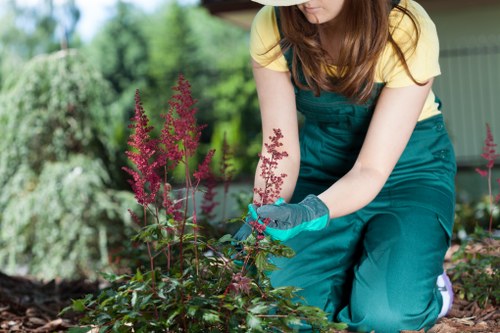
Embracing eco-friendly practices in garden maintenance in Heston contributes to a sustainable environment and reduces your ecological footprint. Here are some strategies to make your garden more eco-friendly:
- Composting: Recycle kitchen scraps and garden waste to create nutrient-rich compost for your plants.
- Rainwater Harvesting: Collect rainwater to use for irrigation, conserving water resources.
- Natural Pest Control: Use beneficial insects and organic treatments to manage pests without harmful chemicals.
- Mulching: Apply organic mulch to retain soil moisture, suppress weeds, and improve soil health.
- Native Plants: Incorporate native species that require less water and are more resistant to local pests.
Implementing these practices not only benefits the environment but also promotes a healthier and more resilient garden.
Maintaining Garden Structures
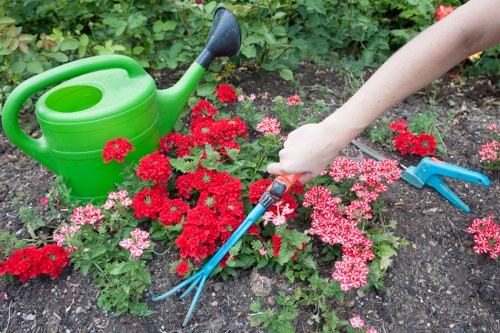
Garden structures such as fences, sheds, and pergolas add functionality and aesthetic appeal to your outdoor space. Proper maintenance of these structures is essential to ensure their longevity and safety.
Fences and Gates
Inspect fences and gates regularly for signs of wear, such as cracking, warping, or rusting. Apply protective coatings or paint to prevent damage from the elements. Tighten loose fittings and replace any broken components promptly.
Sheds and Storage
Keep sheds clean and organized to protect your garden tools and equipment. Check for leaks or structural issues and address them immediately. Ensure that storage areas are well-ventilated to prevent mold and mildew growth.
Outdoor Furniture and Structures
Maintain outdoor furniture by cleaning and treating them to withstand weather conditions. Regularly inspect pergolas, gazebos, and other structures for stability and integrity. Repair or reinforce as needed to ensure safety and durability.
Taking care of garden structures not only enhances the functionality of your garden but also preserves their appearance and value over time.
Lawn Care Tips for a Healthy Green Space
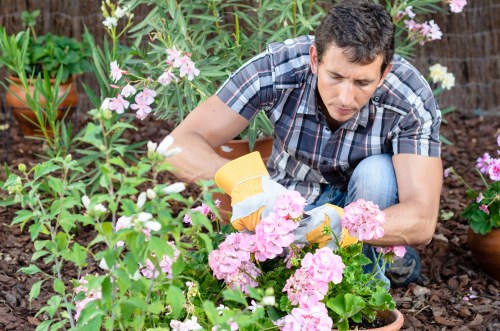
A lush, green lawn is the centerpiece of many gardens. Proper garden maintenance in Heston includes several lawn care practices to keep your grass healthy and vibrant.
Mowing Techniques
Regular mowing is essential for maintaining a neat and healthy lawn. Follow these tips for effective mowing:
- Height: Adjust your mower to cut grass to the recommended height for your grass type. Cutting too short can stress the grass.
- Frequency: Mow frequently enough to remove no more than one-third of the grass blade's height at each mowing session.
- Sharp Blades: Keep mower blades sharp to ensure clean cuts and prevent tearing of the grass blades.
Watering Practices
Proper watering is crucial for a healthy lawn. Water deeply and infrequently to encourage deep root growth. Early morning is the best time to water to reduce evaporation and prevent disease.
Fertilization
Apply a balanced fertilizer during the growing season to provide essential nutrients. Avoid over-fertilizing, which can lead to excessive growth and environmental runoff.
Weed Control
Maintain a thick, healthy lawn to naturally reduce weed growth. Hand-pull weeds or use appropriate herbicides if necessary, ensuring minimal impact on desirable grass.
Implementing these lawn care tips will help you achieve a beautiful, resilient lawn that enhances the overall appeal of your garden.
Managing Pests and Diseases in Your Garden
Effective pest and disease management is a critical aspect of garden maintenance in Heston. Unchecked pests and diseases can cause significant damage to your plants, leading to reduced growth and aesthetic appeal.
Identifying Common Pests
Familiarize yourself with the common pests that affect gardens in Heston, such as aphids, slugs, and caterpillars. Recognizing the signs of infestation early allows for prompt and effective treatment.
Natural Pest Control Methods
Whenever possible, utilize natural pest control methods to minimize chemical use. Introduce beneficial insects like ladybugs and lacewings that prey on harmful pests. Use neem oil or insecticidal soap as organic treatment options.
Disease Prevention
Prevent plant diseases by ensuring proper spacing for air circulation, watering at the base of plants to keep foliage dry, and removing any infected plant material promptly. Rotate crops annually to reduce the buildup of soil-borne diseases.
Integrated Pest Management (IPM)
Implement an Integrated Pest Management approach that combines multiple strategies for sustainable pest and disease control. Monitor your garden regularly, use preventive measures, and apply treatments judiciously when necessary.
By adopting these pest and disease management practices, you can maintain a healthy garden ecosystem and reduce the need for harmful chemical interventions.
Soil Health and Fertility
The foundation of a thriving garden is healthy, fertile soil. Effective garden maintenance in Heston involves regular soil testing and amendments to ensure optimal growing conditions for your plants.
Soil Testing
Conduct soil tests to determine pH levels and nutrient content. Understanding your soil's characteristics helps you make informed decisions about fertilization and plant selection.
Amending the Soil
Based on soil test results, add necessary amendments such as compost, lime, or sulfur to adjust pH and enhance fertility. Organic matter improves soil structure, water retention, and nutrient availability.
Mulching
Applying mulch not only conserves moisture and suppresses weeds but also gradually enriches the soil as it decomposes. Use organic mulches like bark, straw, or grass clippings for added benefits.
Crop Rotation
Rotate plant families annually to prevent nutrient depletion and reduce the risk of soil-borne diseases. This practice promotes a balanced soil ecosystem and enhances plant health.
Maintaining soil health through these practices ensures a productive and sustainable garden that supports robust plant growth.
Designing a Low-Maintenance Garden
For those seeking to minimize the time and effort required for garden maintenance in Heston, designing a low-maintenance garden is an ideal solution. This approach focuses on selecting the right plants and design elements that require minimal upkeep while providing maximum aesthetic appeal.
Choosing Drought-Resistant Plants
Select plants that are drought-resistant and require less frequent watering. Succulents, ornamental grasses, and native perennials are excellent choices for low-maintenance gardens.
Incorporating Hardscaping
Integrate hardscaping elements like stone pathways, patios, and mulch beds to reduce the areas that require planting and maintenance. These features add structure and visual interest to your garden.
Group Plants by Water Needs
Arrange plants with similar water requirements together to streamline your watering routine. This strategy ensures that each plant receives the appropriate amount of moisture without overwatering.
Minimal Pruning and Deadheading
Choose plants that require minimal pruning and deadheading. This reduces the time spent on maintenance tasks while keeping your garden looking neat and tidy.
By implementing these design principles, you can enjoy a beautiful garden that remains manageable and stress-free.
Implementing a Garden Maintenance Schedule
Establishing a structured maintenance schedule is key to effective garden maintenance in Heston. A well-planned schedule ensures that no essential tasks are overlooked and that your garden remains in top condition throughout the year.
Monthly Tasks
Outline specific tasks to be completed each month, such as fertilizing, pruning, or planting new blooms. Assigning tasks to each month helps distribute the workload and ensures timely execution.
Weekly Routines
Create weekly routines for activities like weeding, watering, and mowing the lawn. Consistent attention to these tasks prevents issues from escalating and maintains garden health.
Seasonal Checks
Conduct seasonal inspections to assess the overall state of your garden. Look for signs of pests, diseases, or structural damage, and address any problems promptly.
Using Tools and Reminders
Utilize gardening tools, apps, or calendars to track your maintenance schedule. Setting reminders ensures that you stay on top of tasks and maintain a consistent care routine.
Implementing a garden maintenance schedule not only enhances the efficiency of your efforts but also contributes to the long-term success and beauty of your garden.
Benefits of a Well-Maintained Garden
A well-maintained garden offers numerous benefits that extend beyond visual appeal. Here are some of the advantages of investing time and effort into garden maintenance in Heston:
- Aesthetic Appeal: A tidy and vibrant garden enhances the overall beauty of your property and creates a welcoming environment.
- Environmental Impact: Healthy gardens support local biodiversity, provide habitats for beneficial insects and birds, and contribute to improved air quality.
- Health Benefits: Gardening activities promote physical exercise, reduce stress, and provide opportunities for outdoor relaxation.
- Property Value: A well-kept garden increases the market value of your property and makes it more attractive to potential buyers.
- Sustainability: Implementing eco-friendly practices in your garden supports sustainable living and conserves natural resources.
By maintaining your garden diligently, you enjoy these benefits while fostering a harmonious relationship with nature.
Common Mistakes to Avoid in Garden Maintenance
Avoiding common pitfalls can significantly improve your garden maintenance in Heston. Here are some frequent mistakes and how to prevent them:
Overwatering
Overwatering can lead to root rot and other plant diseases. Ensure you understand the watering needs of each plant and avoid excessive moisture.
Poor Pruning Techniques
Improper pruning can damage plants and inhibit their growth. Learn the correct pruning methods for different plant types and tools to use.
Ignoring Soil Health
Neglecting soil testing and amendments can result in nutrient deficiencies and poor plant health. Regularly assess and enhance your soil to support robust growth.
Using Chemicals Excessively
Relying heavily on chemical fertilizers and pesticides can harm beneficial insects and degrade soil quality. Opt for organic and sustainable alternatives whenever possible.
Neglecting Regular Maintenance
Failing to adhere to a maintenance schedule can lead to overgrown plants, weed infestations, and declining garden health. Stay consistent with your care routine to prevent these issues.
By being mindful of these common mistakes, you can ensure a healthier, more beautiful garden with less effort and fewer setbacks.
Enhancing Your Garden with Landscaping Features
Incorporating landscaping features can transform your garden into a stunning outdoor retreat. Thoughtful additions like water features, garden paths, and lighting not only enhance aesthetics but also improve functionality.
Water Features
Add ponds, fountains, or waterfalls to introduce a soothing element to your garden. Water features attract wildlife and create a tranquil atmosphere.
Pathways and Walkways
Create clear pathways using stone, gravel, or wood to guide visitors through your garden and prevent trampling of plants.
Outdoor Lighting
Illuminate your garden with strategically placed lighting to highlight key features and extend the usability of your garden into the evening hours.
Seating Areas
Incorporate benches, swings, or patio furniture to provide comfortable spots for relaxation and enjoyment of your garden.
These landscaping enhancements not only beautify your space but also make your garden a more enjoyable and inviting place to spend time.
Incorporating Sustainable Practices in Garden Maintenance
Adopting sustainable practices in your garden maintenance in Heston promotes environmental stewardship and ensures the long-term health of your garden. Here are some sustainable strategies to consider:
- Organic Gardening: Use organic fertilizers and pest controls to maintain soil health and protect beneficial organisms.
- Water Conservation: Implement drip irrigation systems and rain barrels to minimize water usage.
- Reducing Waste: Compost garden and kitchen waste to reduce landfill contributions and enrich your soil.
- Native Plantings: Plant native species that require fewer resources and support local wildlife.
- Energy-Efficient Tools: Use manual or battery-powered gardening tools to reduce energy consumption and emissions.
Integrating these sustainable practices into your garden maintenance routine not only benefits the environment but also fosters a healthy and resilient garden.
Conclusion: Achieving a Flourishing Garden in Heston
Effective garden maintenance in Heston combines knowledge, regular care, and the right tools to create and sustain a beautiful outdoor space. By following the tips and strategies outlined in this guide, you can ensure that your garden remains healthy, vibrant, and a source of pride.
Whether you choose to maintain your garden yourself or enlist the help of professional services, consistency and attention to detail are key. Embrace sustainable practices, select suitable plants, and stay organized with a maintenance schedule to enjoy a flourishing garden year-round.
Contact us today to learn more about our professional garden maintenance services in Heston and take the first step towards transforming your outdoor space into a stunning oasis. Book your service now and experience the joy of a meticulously maintained garden.
